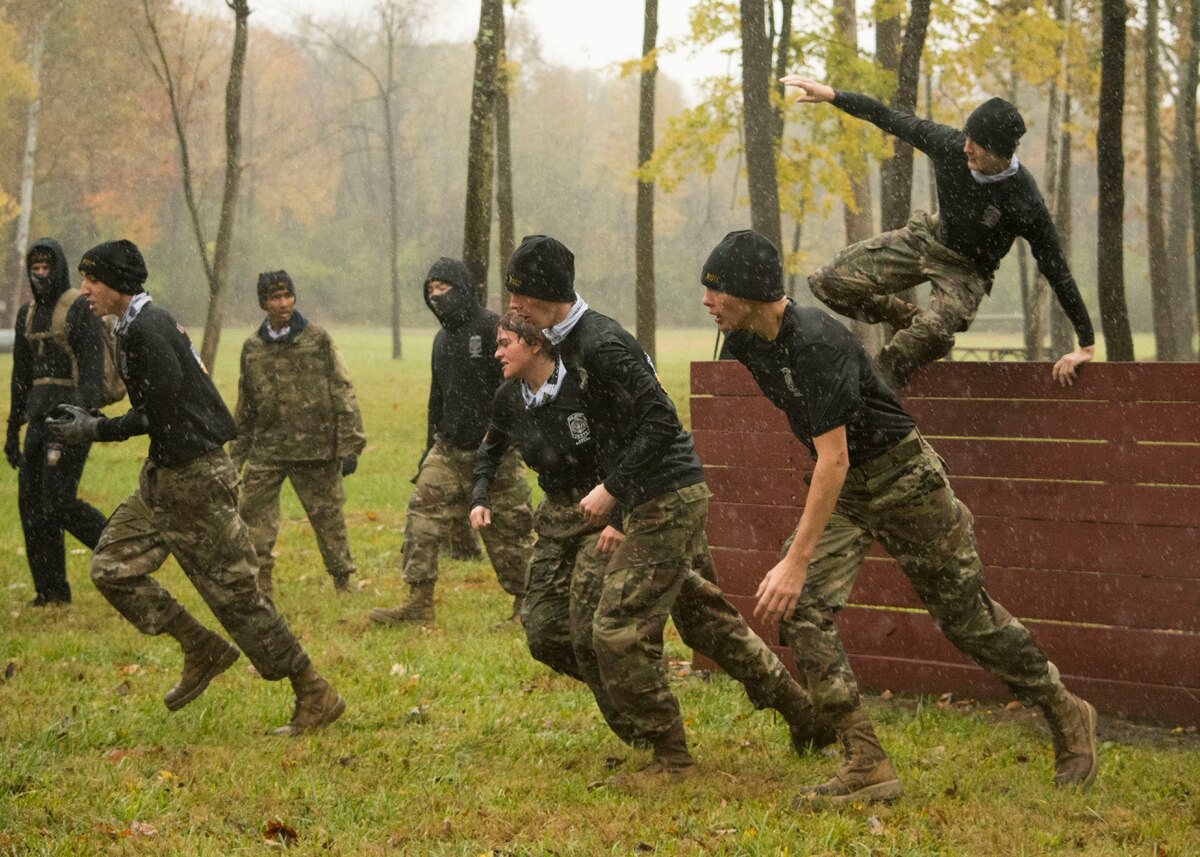Jonah Walters / Jacobin Magazine -
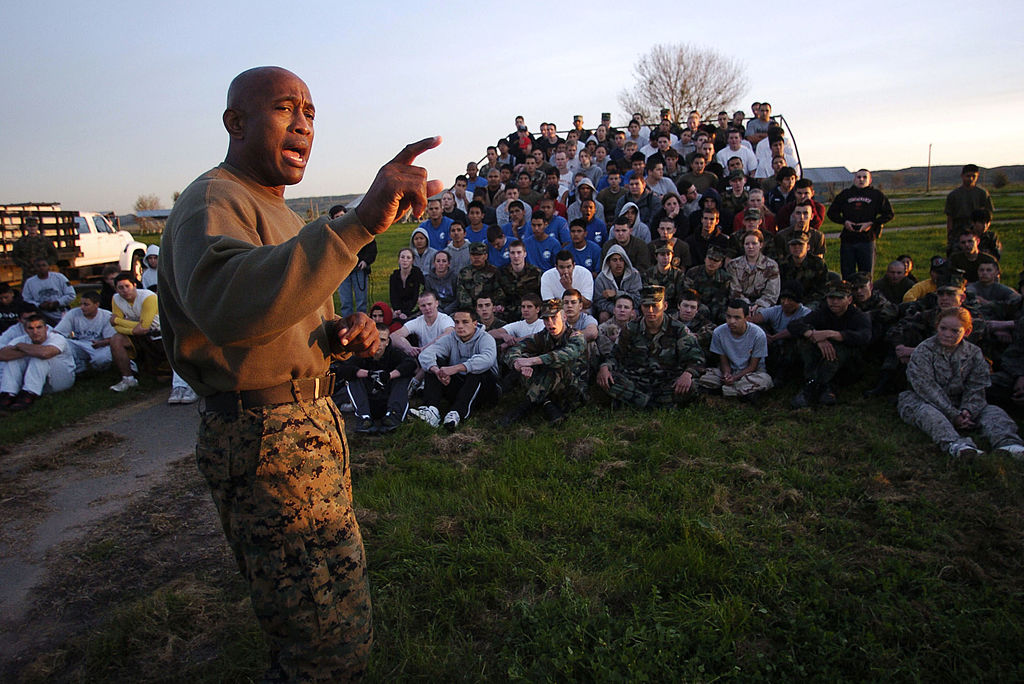
Military recruiters understand that widespread joblessness is good for enlistment. They celebrate the arrival of “Sergeant Hard Times,” recognizing that misery is the best motivator.
The corona virus crisis has been a double-edged sword for military recruitment in the United States. On the one hand, the tightening of the labor market contributed to higher rates of retention than the Army brass expected, meaning that many soldiers decided to reenlist this spring rather than pursue civilian employment when their terms of service expired. On the other hand, recruiting stations across the country have had to shut down to comply with social distancing guidelines, limiting recruiters’ access to young people and inhibiting the “kneecap-to-kneecap” conversations recruiters widely acknowledge to be essential to their work.
Less than one percent of the Armed Forces’ target demographic — seventeen- to twenty-four-year-olds — is actively interested in a military career. After a “kneecap-to-kneecap” encounter with a recruiter, whether at a recruiting station or a school event, probability of enlistment climbs to more than 50 percent, according to the Army.
The reasons for this have been well-documented by anti-recruitment activists for decades. Recruiters, who are expected to meet regular enlistment quotas, aggressively pursue young people who express interest, generally attempting to separate them from parents, teachers, counselors, and others who might advocate for civilian careers.
Gary Ghirardi – OpEd – June 2020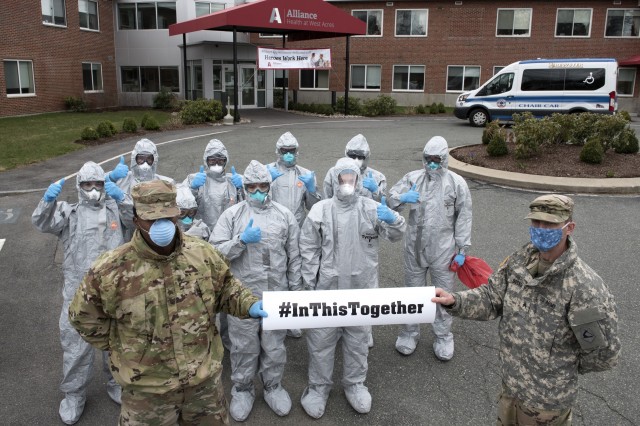 Back in May of 2020, I caught an interview on Pacifica's KPFK radio on a morning program where a young woman was explaining the loss of her aunt that was a nurse in a hospital engaging the Coronavirus. She recounted her aunt telling her that she was not provided with masks or gloves and that a patient had sneezed in her face a week prior to her falling ill. All this culminated with a Zoom meeting with the family saying goodbye before she died. Later that day I passed a local hospital that had placed a large banner on the street honoring our heroes that were fighting the current epidemic.
Back in May of 2020, I caught an interview on Pacifica's KPFK radio on a morning program where a young woman was explaining the loss of her aunt that was a nurse in a hospital engaging the Coronavirus. She recounted her aunt telling her that she was not provided with masks or gloves and that a patient had sneezed in her face a week prior to her falling ill. All this culminated with a Zoom meeting with the family saying goodbye before she died. Later that day I passed a local hospital that had placed a large banner on the street honoring our heroes that were fighting the current epidemic.
In my work for The National Network Opposing the Militarization of Youth, I am constantly reminded of a similar refrain from those pushing back against our work of getting youth, with limited opportunities for their futures, to consider all the ramifications of serving in the United State's post 9/11 military. That push-back always invokes the heroic diatribes defending those who serve in our military branches and a forceful reminder of how dare we try to diminish the sacrifice of heroes who have served or are considering serving by revealing the harmful realities of military service. Of course we do not diminish their service but try to put it in context to a fuller and more accurate disclosure of what military recruiters manage to leave out of their enlistment appeals. The relationship between these two scenarios, and the contradictions inherent in both, stayed with me all week and encouraged this short OpEd.
Cómo COVID-19 está afectando el Programa de Entrada Retrasada y amenazando la salud de los reclutas.
Por Pat Elder / Red nacional de oposición a la militarización de la juventud, NNOMY - 8 de junio de 2020
- Read the version in English
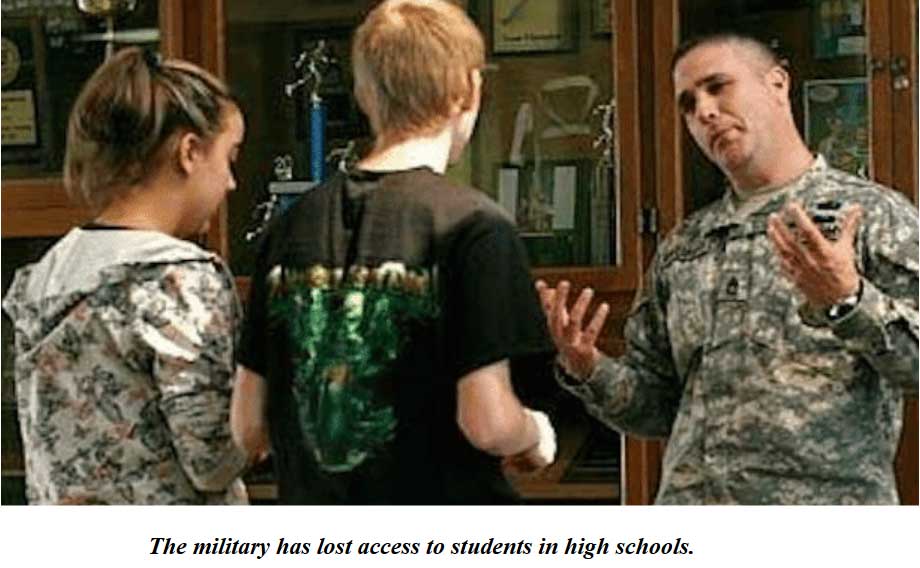 COVID-19 ha impactado profundamente la forma en que los militares encuentran nuevos soldados. El comando de reclutamiento fue atrapado sin preparación para enfrentar la pandemia y se enfrenta a una nueva realidad desafiante.
COVID-19 ha impactado profundamente la forma en que los militares encuentran nuevos soldados. El comando de reclutamiento fue atrapado sin preparación para enfrentar la pandemia y se enfrenta a una nueva realidad desafiante.
El reclutamiento militar es una búsqueda psicológica intensa que tradicionalmente se ha basado en la capacidad de los reclutadores para desarrollar relaciones cercanas con los adolescentes. Estas relaciones se cultivaron en las escuelas secundarias de la nación, donde los reclutadores tenían acceso a los niños. Los reclutadores sirvieron como entrenadores y tutores. Trajeron donas a la facultad. Almorzaron con perspectivas, a veces cien veces en un solo año escolar. Los reclutadores militares jugaron baloncesto uno a uno después de la escuela con reclutas potenciales y se hicieron mejores amigos con algunos niños. Tan amigable, cientos de reclutadores masculinos han sido implicados en relaciones sexuales inapropiadas con niñas menores de edad.
Las escuelas secundarias eran el centro del universo de reclutamiento, pero eso terminó abruptamente en marzo cuando se rompió la tubería de alistamiento. Los reclutadores alistaron a personas de la tercera edad y los colocaron en el Programa de Ingreso Retrasado (DEP) en el cual el ingreso de un estudiante al servicio activo se pospone por hasta 365 días. (El Ejército ahora lo llama el Programa del Futuro Soldado). El objetivo del programa DEP es mantener la motivación del futuro soldado mientras se minimiza el desgaste. Cuando los miembros del DEP se presentan a la capacitación básica, se les accede (se alistan) al servicio activo.
En realidad, hay dos acciones de procesamiento de alistamiento: contratar al DEP y acceder al servicio activo. Es el segundo lo que importa.
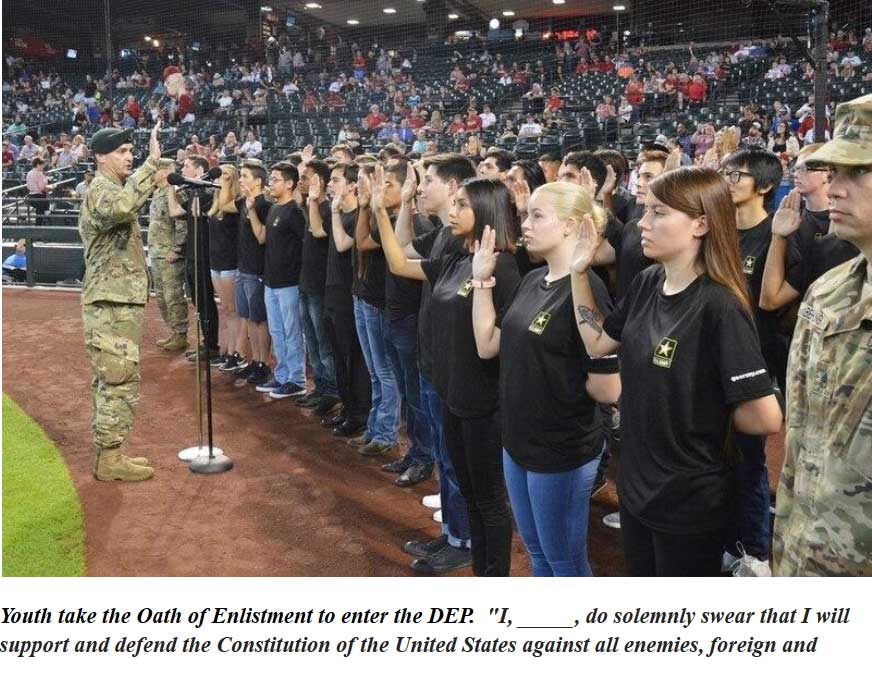
Los jóvenes hacen el juramento de alistamiento para ingresar al DEP. "Yo, _____, juro solemnemente que apoyaré y defenderé la Constitución de los Estados Unidos contra todos los enemigos, extranjeros y nacionales; que tendré verdadera fe y lealtad a los mismos; y que obedeceré las órdenes del Presidente de los Estados Unidos.."
El DEP es el componente central del proceso de reclutamiento militar. Si los miembros del DEP cambian de opinión y deciden no ingresar al ejército, se les permite irse sin consecuencias adversas. Una vez que dejan de responder a su reclutador y están fuera. Cuando los reclutas no se presentan al campo de entrenamiento, son despedidos. "Es como despertarse de una pesadilla", explicó un enlistado. Hay una larga historia de abuso por parte de los reclutadores y el comando hacia los miembros del DEP que renuncian, mientras que muchos jóvenes y sus familias desconocen la naturaleza no vinculante del DEP.
Antes de la pandemia, se alentó a las personas mayores en el DEP a pasar una cantidad significativa de tiempo con otros miembros del DEP y su reclutador que los adoctrinó en una cultura militar con ejercicios y ceremonias, lecciones sobre la cadena de mando y estructura de rango.
La participación personal y cercana del reclutador evitó que los jóvenes impredecibles se fueran. Los adolescentes impetuosos que cumplen 18 años a menudo se registran sin pensarlo claramente. Si bien el comportamiento de reclutamiento en las escuelas secundarias de la nación se ha vuelto cada vez más depredador, la Asociación Estadounidense de Salud Pública dice que hay evidencia significativa de que el cerebro adolescente no está equipado para hacer cálculos de riesgo precisos. Los niños a menudo expresan "remordimiento del comprador", por lo que el trabajo del reclutador no es solo hacer que las personas mayores se inscriban, sino mantenerlos en el DEP hasta que llegue el momento de enviar al campamento de entrenamiento. Aquí es precisamente donde los militares son más vulnerables a la agitación causada por la pandemia.
Un estudio que analizó datos sobre más de 1.3 millones de participantes de DEP desde el año fiscal 2005 hasta el año fiscal 2012 encontró que la deserción aumenta cuanto más tiempo un miembro está en el DEP, por lo que es necesario que las sucursales muevan rápidamente a los reclutas que se inscribieron antes en el año académico para iniciar el campamento. Históricamente, casi la mitad de los que participan en el programa Future Soldier del Ejército están en el DEP durante dos o menos meses. Muchos se inscriben en abril y mayo y se envían al campamento de entrenamiento en junio y julio. Solo el 15% permanece en el DEP 7 o más meses.
El ejército tenía la tasa de deserción de DEP más baja entre los servicios con 11.0%. En contraste, más del 40% de los miembros del DEP de la Infantería de Marina y la Marina permanecen 7 o más meses y tienen tasas de deserción de DEP promedio de 17.8% y 20.8% respectivamente. La Fuerza Aérea, con más del 60% de sus duraciones DEP entre 3 y 6 meses, promedió una tasa de deserción del 12.7%.
El DOD no proporciona las fortalezas actuales de los DEP en cada rama, aunque sabemos que muchas personas mayores no se deciden hasta el cuarto trimestre académico, y este año, el trimestre se canceló debido a COVID-19, dejando el DEP en peligro.
La ausencia del toque humano del comando y las incertidumbres de reportarse al campo de entrenamiento en medio de historias de brotes en el Fort Jackson, Fort Benning, Fort Leonard Wood o el Depósito de reclutas del Cuerpo de Infantería de Marina de San Diego y el Depósito de reclutas Perris Island del ejército han hecho que muchos piensen dos veces antes de reportarse al campo de entrenamiento. El reclutamiento naval se enfrenta a la preocupación pública por los brotes de COVID-19 en 40 barcos, sobre todo, las historias de miles de marineros infectados en el USS Teddy Roosevelt.
Las madres de jóvenes en el DEP se han comunicado, expresando profundas preocupaciones, mientras que muchos reclutas adolescentes pueden ser ajenos a los peligros o no han desarrollado capacidades de razonamiento de adultos, como sugiere la Asociación Estadounidense de Salud Pública. Las mamás tienen todas las razones para estar preocupadas.
Más de 140 soldados y aprendices del Ejército en Fort Benning, Georgia, y más de 70 en Fort Leonard Wood, Missouri, dieron positivo por el coronavirus, informó el Ejército a principios de junio.
En el Depósito de reclutas Parris Island del Cuerpo de Marines en Carolina del Sur, donde se informó un brote, los reclutas usaron máscaras en las formaciones más grandes, pero durante algunas pruebas físicas, incluso aquellas en las que era necesario el trabajo en equipo y el distanciamiento social imposible, las máscaras salieron . La mayoría de los instructores de perforación usaban el suyo en todo momento, al igual que el secretario de Defensa Mark Esper y su séquito cuando lo visitó a fines de mayo, según Stars and Stripes.
El Cuerpo de Marines no informa sobre el número de infecciones por COVID-19 en Parris Island, que se encuentra dentro del área del código postal 29902. Los datos del Departamento de Salud y Control Ambiental del SC el 6 de junio muestran que 99 casos confirmados y 608 sospechosos se han reportado casos en el código postal 29902 desde que comenzó la pandemia el 6 de junio de 2020.
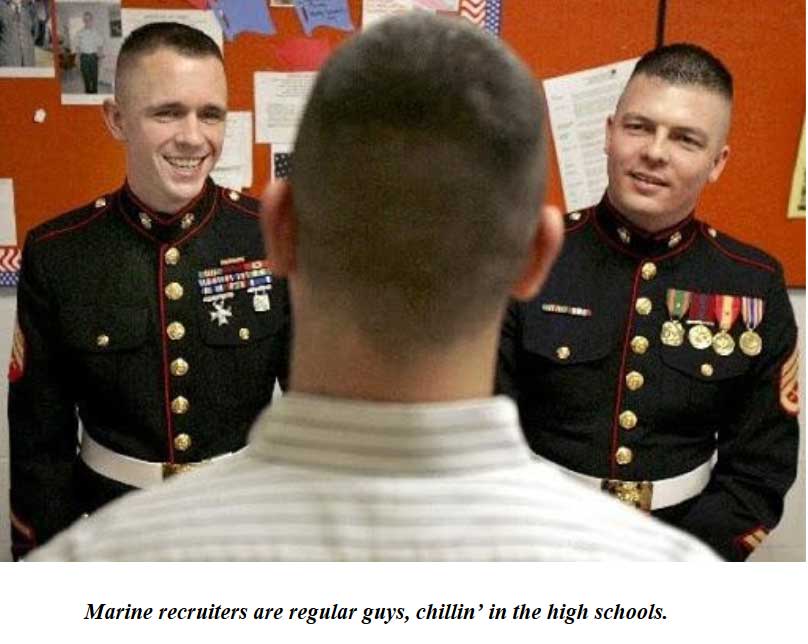 Stars and Stripes, una fuente crítica de información perteneciente a las fuerzas armadas, informa que todos los servicios han experimentado una disminución drástica en la cantidad de reclutas que agregaron. sus DEPs. El mayor general Frank Muth, comandante general del Comando de Reclutamiento del Ejército de EE. UU. Dijo que espera enfrentar un déficit a fines de mayo de aproximadamente 3,100 reclutas con contratos firmados.
Stars and Stripes, una fuente crítica de información perteneciente a las fuerzas armadas, informa que todos los servicios han experimentado una disminución drástica en la cantidad de reclutas que agregaron. sus DEPs. El mayor general Frank Muth, comandante general del Comando de Reclutamiento del Ejército de EE. UU. Dijo que espera enfrentar un déficit a fines de mayo de aproximadamente 3,100 reclutas con contratos firmados.
El 18 de marzo, el Ejército cerró el acceso público a sus 1.400 estaciones de reclutamiento. En una semana, más de 20,000 reclutadores militares se quedaron con sus teléfonos celulares, pantallas de computadora, micrófonos, cámaras e información personal detallada sobre decenas de millones de jóvenes estadounidenses. El DOD debe inscribirse 150,000 anualmente para mantenerse a la par con aquellos que dejan el servicio. Muth dijo que su decisión de cerrar las estaciones del público en general se trataba de proteger a su propia gente.
La Armada experimentó una caída del 45% en individuos calificados que expresaron interés en marzo de 2020, en comparación con marzo de 2019. La Fuerza Aérea también experimentó una disminución en el reclutamiento en marzo y abril. El Cuerpo de Marines vio una caída de aproximadamente el 25% en los contactos con personas calificadas en marzo durante el mismo mes del año pasado.
El sargento de artillería. Justin Kronenberg, un portavoz del Comando de Reclutamiento de Infantería de Marina, dijo a Stars and Stripes: "Nuestro proceso sistemático de reclutamiento siempre ha puesto especial importancia en la interacción 'rótula a rótula' entre un reclutador y un solicitante, por lo que puede ser difícil replicar esta evaluación física de esos queriendo convertirse en Marines únicamente a través de medios tecnológicos ".
Casi la mitad de las accesiones del Cuerpo de Marines tienen 18 años. Los que tenían 20 años o menos constituían el 83% de los reclutas del Cuerpo de Marines, el 65% en la Fuerza Aérea y el Ejército; y 64% en la Marina.
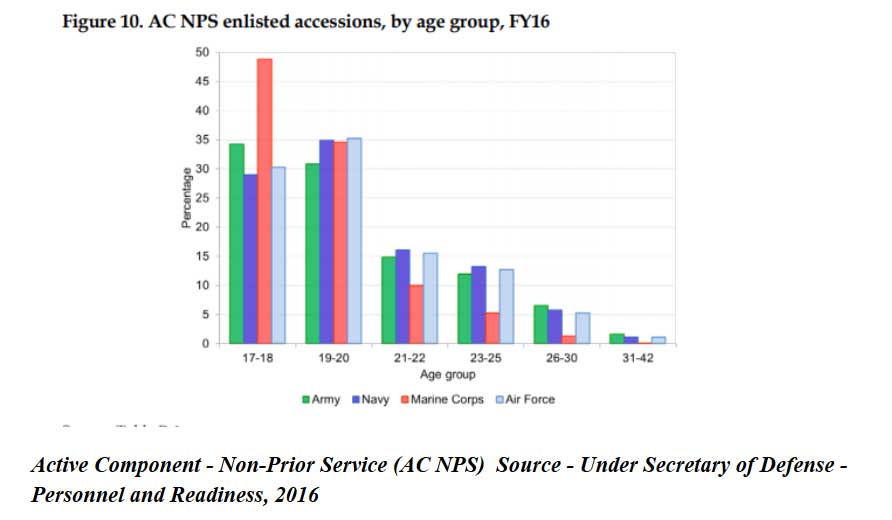
Durante al menos una década, el Ejército ha sido consciente de que la forma en que recluta va a la zaga de los avances tecnológicos empleados por reclutadores corporativos más sofisticados. Pero los militares disfrutaron de una audiencia cautiva en la escuela secundaria, por lo que los reclutadores estaban ocupados "pasando el rato" con posibles reclutas en los estacionamientos de la escuela secundaria o montando cabinas durante los días de carrera o repartiendo tchotchkes gratis en las cafeterías de la escuela secundaria. No estaban al acecho en las salas de juegos y en las redes sociales en la medida en que lo están ahora.
Los reclutas completaron varias actividades físicas como correr, flexiones, etc. Los reclutadores nutrieron a los estudiantes y brindaron orientación. Alentaron a los futuros soldados a invitar a padres, familiares y referencias a eventos de DEP. Jugaron videojuegos y comieron pizza juntos.
El comando de reclutamiento entiende que la "relación reclutador-solicitante-influenciador" es una causa importante de desgaste de DEP. Dicho de otra manera, la novia de Johnny o su madre pueden no querer que se enliste. En el mundo de la pandemia, estos "influenciadores" pueden tener más ventaja sobre el reclutador virtual.
El comando dice que el contacto entre el reclutador y el miembro del DEP y sus influenciadores debe ser "frecuente, genuino, honesto y directo". Seguramente, las redes sociales ofrecen la frecuencia, pero pueden carecer de su capacidad para proyectar reclutadores como genuinos, honestos y directos.
Las interacciones humanas no se pueden replicar automáticamente a través de máquinas.
La siguiente tabla enumera las principales razones para la separación del DEP. Aunque no se menciona específicamente, la razón principal es que los adolescentes cambian de opinión y ya no quieren ir. ¿Cuántos más en el DEP están cambiando de opinión debido al coronavirus?
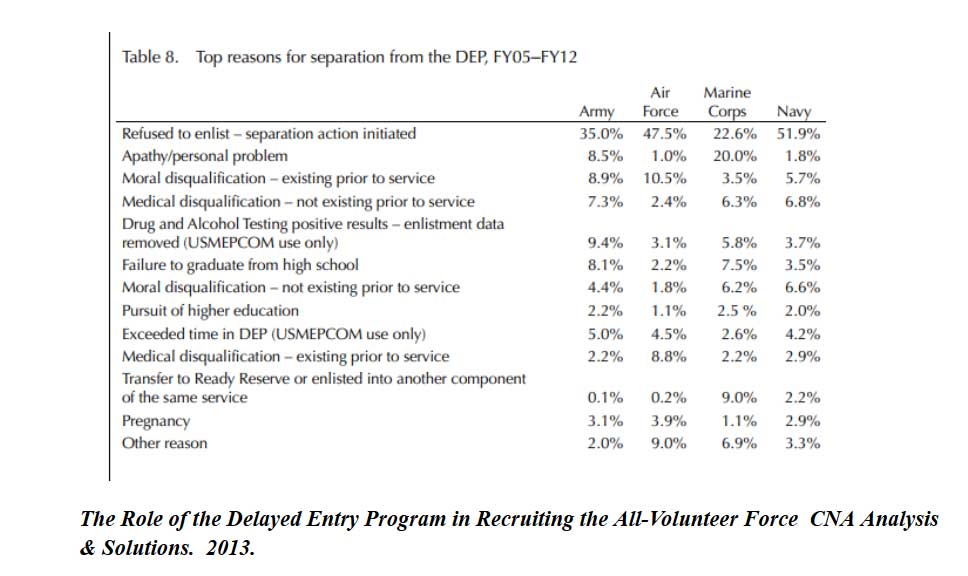
El reclutamiento militar ha pasado de una búsqueda intensamente personal a una experiencia en línea relativamente estéril. Los reclutadores pasan la mayor parte de sus días digitales en las redes sociales. Los jóvenes de 18 años a menudo no "hacen" correos electrónicos, y rara vez hablan por teléfono, mientras que los mensajes de texto son frecuentemente ignorados. El truco para los reclutadores es involucrar a los adolescentes en plataformas de video como Instagram, Facetime y Zoom, donde los reclutadores pueden esperar humanizar la interacción y generar confianza.
 Los reclutadores organizan enormes torneos de juegos que promueven "Call of Duty", que se basa en la parte de combate de pertenecer a las fuerzas armadas. Los reclutadores esperan que su atractivo visceral y su capacidad para atraer grandes audiencias a nivel nacional les permitan recopilar clientes potenciales.
Los reclutadores organizan enormes torneos de juegos que promueven "Call of Duty", que se basa en la parte de combate de pertenecer a las fuerzas armadas. Los reclutadores esperan que su atractivo visceral y su capacidad para atraer grandes audiencias a nivel nacional les permitan recopilar clientes potenciales.
El Programa de Bienestar y Recreación Moral Lewis-McChord de la Base Conjunta del Ejército (JBLM MWR) organiza estos torneos. Están patrocinados por la United Services Automobile Association (USAA) y son utilizados por el comando de reclutamiento para mantener a los miembros del DEP informados y alcanzar nuevas perspectivas. Las salas de chat discuten cosas como la cantidad necesaria de asesinatos para iniciar killstreaks o la importancia de la organización y el trabajo en equipo. Los reclutadores acechan en las salas de chat.
El Ejército anunció recientemente que está aflojando las restricciones sobre cómo los reclutadores pueden usar Facebook. El ejército instruye a sus reclutadores:
“Puedes usar tu página personal de Facebook para convertirte en administrador de una página de fans. Cualquiera que tenga derechos de administrador para la página de fans puede otorgarle derechos de administrador para la página de fans; su información no se compartirá en la página de fans y nadie fuera de los administradores de la página sabrá que usted es un administrador de la página de fans. Determine su propia configuración de privacidad; estos no serán violados si usted es administrador de una página de fans. Dirija el tráfico a su página de fans y mantenga su vida personal separada del trabajo. Además, se recomienda encarecidamente que utilice la configuración de privacidad "solo amigos" en las páginas personales para proteger su información personal ".
El gobierno de los Estados Unidos está espiando subrepticiamente a nuestros hijos.
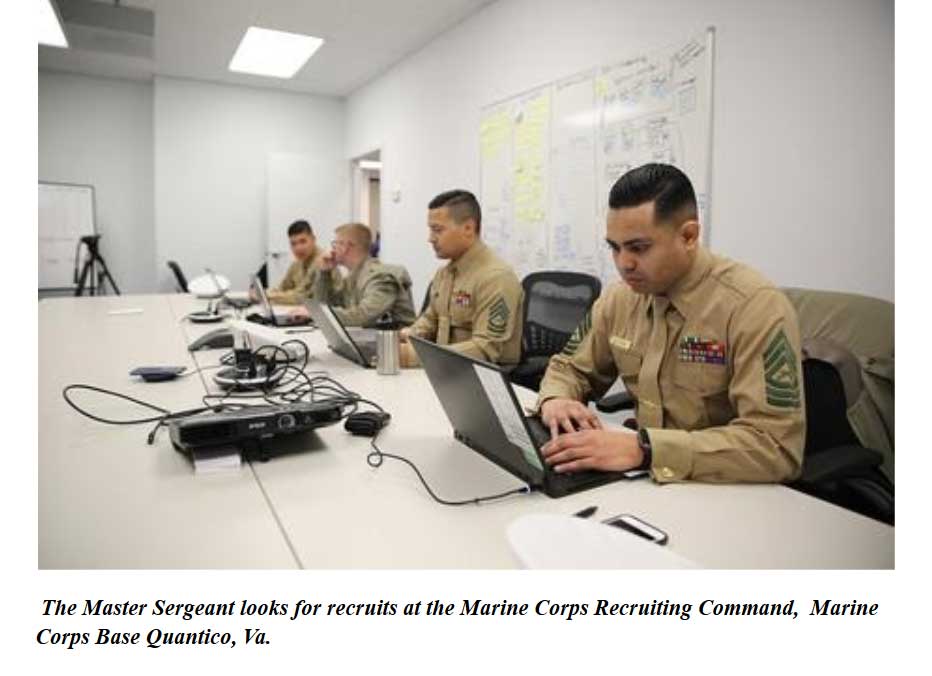
“Las computadoras portátiles de los reclutadores se cargan con información personal sobre los jóvenes tomados de los sitios de redes sociales. La información se fusiona con los datos de la Base de datos de reclutamiento de investigación y estudios de mercado de publicidad conjunta del Departamento de Defensa (JAMRS) y el resultado es asombroso. El reclutador sabe que Johnny lee revistas de lucha libre, pesa 160, puede hacer press de banca 180, conduce un Ford F150 de doce años y le gustan BTS y Kpop. Y aunque nunca han hablado, el reclutador local asignado a la escuela secundaria de Johnny sabe que a Sam, su novia, le encantaría verlo enlistarse y que ella ama a Zendaya y que a ambos les gusta el kayak. Incluso saben que a la madre de Johnny no le importa mucho Sam. Suena superfluo, pero este tipo de detalles son más importantes hoy que nunca. Proporcionan una conexión humana antes de llegar digitalmente.
Los reclutadores hacen un seguimiento de los miembros de DEP y posibles reclutas en los sitios de redes sociales en busca de signos de descalificación, como peso, tatuajes, problemas de educación, drogas o aplicación de la ley. Los reclutadores del ejército utilizan la capacidad de escaneo en vivo del FBI para realizar comprobaciones rápidas de huellas dactilares. Documentación importante como diplomas, certificados de nacimiento y tarjetas de Seguro Social se transmiten electrónicamente ahora. Con la excepción del examen físico, todo se hace virtualmente. Los reclutadores se han convertido en algo así como asociados en centros de llamadas de tarjetas de crédito, atención médica y compañías de seguros.
Cuando es necesario el contacto personal directo con el comando de reclutamiento, se pone en peligro la salud de los miembros del DEP. La Prueba de aptitud de combate del ejército, un componente crítico del proceso de reclutamiento, no se puede lograr a través de una pantalla de computadora. Durante la carrera de 2 millas, dice el Ejército, se pondrá a disposición de los corredores un número limitado de carriles. La prueba de flexiones requiere que otra persona cuente correctamente las repeticiones, pero la persona que realiza el seguimiento puede contar a una distancia de 6 pies. Los soldados deberán limpiar cada pieza del equipo de ejercicio con desinfectante después de completar la prueba correspondiente. El Ejército eventualmente puede resolverlo, pero es probable que sea a expensas de la salud de miles de jóvenes de 18 años en el camino. El virus explotará el eslabón más débil en la cadena de defensas virales del Ejército.
Una vez que los candidatos envían al campo de entrenamiento, son puestos en cuarentena durante dos semanas. Después de eso, el Pentágono parece estar inventando a medida que avanzan. A principios de mayo, el Departamento de Defensa dijo que un paciente recuperado de COVID-19 no sería elegible para unirse al ejército. El Departamento de Defensa revirtió el curso poco después y dijo que solo los reclutas que habían sido hospitalizados por COVID-19 serían prohibidos. A mediados de mayo, el DOD anunció que los reclutas que se hayan recuperado serán examinados por un médico para determinar si hay efectos a largo plazo.
El comando de reclutamiento está en serios problemas porque un gran número de reclutas potenciales y sus familias se dan cuenta de que es un momento terrible para alistarse.
Los jóvenes que se inscriben en el DEP están poniendo en peligro su salud. Las decisiones del Departamento de Defensa con respecto a Covid 19 continuarán siendo guiadas por su capacidad para llenar los rangos.
Fuentes utilizadas para este artículo
###
How COVID-19 is impacting the Delayed Entry Program and threatening the health of recruits.
By Pat Elder / National Network Opposing the Militarization of Youth, NNOMY - June 8, 2020
- Leer la versión en español COVID-19 has profoundly impacted the way the military finds new soldiers. The recruiting command was caught unprepared to face the pandemic and is facing a challenging new reality.
COVID-19 has profoundly impacted the way the military finds new soldiers. The recruiting command was caught unprepared to face the pandemic and is facing a challenging new reality.
Military recruiting is an intense, psychological pursuit that has traditionally relied on the ability of recruiters to develop close relationships with teenage prospects. These relationships were cultivated in the nation’s high schools where recruiters enjoyed access to children. Recruiters served as coaches and tutors. They brought donuts to the faculty. They ate lunch with prospects, sometimes a hundred times in a single school year. Military recruiters played one-on-one basketball after school with potential recruits and became best of friends with some kids. So friendly, hundreds of male recruiters have been implicated in inappropriate sexual relationships with underaged girls.
High schools were the center of the recruiting universe, but that ended abruptly in March when the enlistment pipeline was ruptured. Recruiters enlisted seniors and placed them into the Delayed Entry Program (DEP) in which a student’s entry into active duty is postponed for up to 365 days. (The Army now calls it the Future Soldier Program.) The thrust of the DEP program is to maintain future soldier motivation while minimizing attrition. When DEP members report to basic training, they are accessed (enlisted) into active duty.
Bonnie J Caracciolo / Chelsea Uniting Against the War (CUAW) -
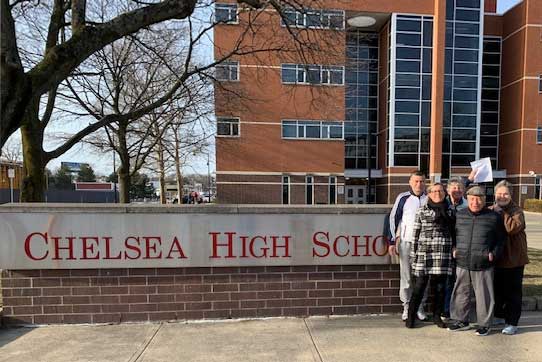 For fourteen years a dedicated group of anti-war citizens in a working-class suburb of Boston, MA, has worked to inform high school students in their community, including their own children, about the perils of military recruitment. Chelsea Uniting Against the War (CUAW) convenes within the first week of the school year to distribute counter-recruitment flyers informing students of the risks of military service. They then follow up this activity by speaking with students one-on-one during school lunch breaks while distributing forms to opt out of school releases of student information to military recruiters. These lunchtime events occurred twice each year and were always preceded by a phone call to the principal’s office to determine an appropriate date. At no time did CUAW enter the school without prior notice.
For fourteen years a dedicated group of anti-war citizens in a working-class suburb of Boston, MA, has worked to inform high school students in their community, including their own children, about the perils of military recruitment. Chelsea Uniting Against the War (CUAW) convenes within the first week of the school year to distribute counter-recruitment flyers informing students of the risks of military service. They then follow up this activity by speaking with students one-on-one during school lunch breaks while distributing forms to opt out of school releases of student information to military recruiters. These lunchtime events occurred twice each year and were always preceded by a phone call to the principal’s office to determine an appropriate date. At no time did CUAW enter the school without prior notice.
Elizabeth King /Article Originally appeared in In These Times web edition in June 2019 -
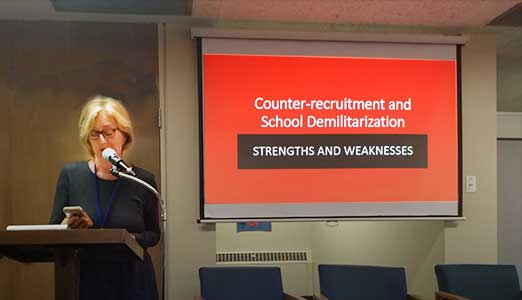 A scrappy counter-recruitment movement is trying to starve the military of labor.
A scrappy counter-recruitment movement is trying to starve the military of labor.
Out of the spotlight, dedicated counter-recruiters around the country are steadfast in their organizing to cut off the human supply chain to the U.S. military.
Eighteen is the youngest age at which someone can join the U.S. military without their parents’ permission, yet the military markets itself to—which is to say recruits—children at much younger ages. This is in part accomplished by military recruiters who visit high schools around the country, recruiting children during career fairs and often setting up recruitment tables in cafeterias and hallways. As a result, most students in the U.S. will meet a military recruiter for the first time at just 17 years old, and children are getting exposed to military propaganda younger and younger.
The recruitment of young people to the military is as old as the military itself, and has become more and more normalized along with the general militarization of schools. According to the Urban Institute, more than two-thirds of public high school students attend schools where there are “school resource officers,” a name for school-based police. This police presences comes on top of the role of military recruiters on campuses, or at college and career fairs.
Rick Jahnkow / Demilitarize Our Schools -
Legislation has recently been suggested that, among other things, would greatly expand the number of JROTC units and make military recruiting a more explicit, formal part of the program's stated purpose. It's part of the Inspired to Serve Act of 2020, which is being proposed by the National Commission on Military, National, and Public Service (NCMNPS). Below is the JROTC-related language (the commission is also recommending draft registration for women):
SEC. 304. EXPANSION OF JUNIOR RESERVE OFFICERS’ TRAINING CORPS PROGRAM
(a) EXPANSION OF JROTC CURRICULUM.—Section 2031(a)(2) of title 10, United States Code, is amended by inserting after “service to the United States,” the following: “including an introduction to service opportunities in military, national, and public service,”.
(b) PLAN TO INCREASE NUMBER OF JROTC UNITS.—The Secretary of Defense, in consultation with the Secretaries of the military departments (as defined in section 102 of title 5, United States Code), shall develop and implement a plan to establish and support not less than 6,000 units of the Junior Reserve Officers’ Training Corps by September 30, 2031.
(c) AUTHORIZATION OF APPROPRIATIONS.—There are authorized to be appropriated such sums as may be necessary to carry out this section.
- National Commission Says Expand Draft Registration to Include Women
- US Peace Prize – How much is Peace worth? A Mission to change the US War Culture | Pressenza International | March 16 2020
- News Advisory: Anti-draft activists call on Congress to end draft registration in response to court case on the Selective Service System and report of National Commission on Military, National, and Public Service.
- One Winning Way to Build the Peace Movement and One Losing Way | CounterPunch | Richard Moser | Feb 21 2020
- Understanding the South's unequal contribution of military recruits
- Ending Our Addiction to Militarism
- Army recruitment today is less "Be all you can be" and more "Call of Duty"
- Mission: Readiness at Year Ten
- Warriors Wanted: Does the US Military Prey on Teenagers? | WhoWhatWhy | Rosa Del Luca | Nov 12 2019
- The Army Beat Its Recruitment Goals This Year by Targeting Students in Debt
- Thank you Summit attendees!
- Local Efforts Towards Military Counter-recruitment in Boston
Subcategories
Opinion Article Count: 2
The NNOMY Opinion section is a new feature of our articles section. Writing on youth demilitarization issues is quite rare but we have discovered the beginning articles and notes being offered on this subject so we have decided to present them under an opinion category. The articles presented do not necessarily reflect the views of the NNOMY Steering Committee.
Globalization & Militarization Article Count: 1
Military Presence in Our Schools Article Count: 8
Art & Cultural Activism Article Count: 1
The Militarization of U.S. Culture Article Count: 23
 Though the United States of America shares with other nations in a history of modern state militarism, the past 65 years following its consolidation as a world military power after World War II, has seen a shift away from previous democratic characterizations of the state. The last thirty years, with the rise of the neo-conservative Reagan and Bush administrations (2), began the abandonment of moral justifications for democracy building replaced by bellicose proclamations of the need and right to move towards a national project of global security by preemptive military force .
Though the United States of America shares with other nations in a history of modern state militarism, the past 65 years following its consolidation as a world military power after World War II, has seen a shift away from previous democratic characterizations of the state. The last thirty years, with the rise of the neo-conservative Reagan and Bush administrations (2), began the abandonment of moral justifications for democracy building replaced by bellicose proclamations of the need and right to move towards a national project of global security by preemptive military force .
In the process of global military expansion, the US population has been subjected to an internal re-education to accept the role of the U.S. as consolidating its hegemonic rule internationally in the interest of liberal ideals of wealth creation and protectionism.
The average citizen has slowly come to terms with a stealthly increasing campaign of militarization domestically in media offerings; from television, movies and scripted news networks to reinforce the inevitability of a re-configured society as security state. The effect has begun a transformation of how, as citizens, we undertand our roles and viability as workers and families in relation to this security state. This new order has brought with it a shrinking public common and an increasing privatization of publicly held infrustructure; libraries, health clinics, schools and the expectation of diminished social benefits for the poor and middle-class. The national borders are being militarized as are our domestic police forces in the name of Homeland Security but largely in the interest of business. The rate and expansion of research and development for security industries and the government agencies that fund them, now represent the major growth sector of the U.S.economy. Additionally, as the U.S. economy continually shifts from productive capital to financial capital as the engine of growth for wealth creation and development, the corporate culture has seen its fortunes rise politically and its power over the public sector grow relatively unchallenged by a confused citizenry who are watching their social security and jobs diminishing.
How increasing cultural militarization effects our common future will likely manifest in increased public dissatisfaction with political leadership and economic strictures. Social movements within the peace community, like NNOMY, will need to expand their role of addressing the dangers of militarists predating youth for military recruitment in school to giving more visibility to the additional dangers of the role of an influential militarized media, violent entertainment and play offerings effecting our youth in formation and a general increase and influence of the military complex in all aspects of our lives. We are confronted with a demand for a greater awareness of the inter-relationships of militarism in the entire landscape of domestic U.S. society. Where once we could ignore the impacts of U.S. military adventurisms abroad, we are now faced with the transformation of our domestic comfort zone with the impacts of militarism in our day to day lives.
How this warning can be imparted in a meaningful way by a movement seeking to continue with the stated goals of counter-recruitment and public policy activism, and not loose itself in the process, will be the test for those activists, past and future, who take up the call to protect our youth from the cultural violence of militarism.
The "militarization of US culture" category will be an archive of editorials and articles about the increasing dangers we face as a people from those who are invested in the business of war. This page will serve as a resource for the NNOMY community of activists and the movement they represent moving into the future. The arguments presented in this archive will offer important realizations for those who are receptive to NNOMY's message of protecting our youth, and thus our entire society, of the abuses militarism plays upon our hopes for a sustainable and truly democratic society.
NNOMY
Resources Article Count: 2
The Resources section covers the following topics:
International Networking Article Count: 1
Book Reviews Article Count: 5
NNOMY Network News Article Count: 12
News reports from the groups associated to the NNOMY Network including Social Media.
CR Reports Article Count: 5
Reports from counter-recruitment groups and activists from the field. Includes information about action reports at recruiting centers and career fairs, school tabling, and actions in relation to school boards and state legislatures.
CR in the News Article Count: 8
David Swanson Article Count: 6
 David Swanson is the author of the new book, Daybreak: Undoing the Imperial Presidency and Forming a More Perfect Union, by Seven Stories Press and of the introduction to The 35 Articles of Impeachment and the Case for Prosecuting George W. Bush by Dennis Kucinich. In addition to cofounding AfterDowningStreet.org, he is the Washington director of Democrats.com and sits on the boards of a number of progressive organizations in Washington, DC.
David Swanson is the author of the new book, Daybreak: Undoing the Imperial Presidency and Forming a More Perfect Union, by Seven Stories Press and of the introduction to The 35 Articles of Impeachment and the Case for Prosecuting George W. Bush by Dennis Kucinich. In addition to cofounding AfterDowningStreet.org, he is the Washington director of Democrats.com and sits on the boards of a number of progressive organizations in Washington, DC.
Charlottesville Right Now: 11-10-11 David Swanson
David Swanson joins Coy to discuss Occupy Charlottesville, protesting Dick Cheney's visit to the University of Virginia, and his new book. - Listen
Jorge Mariscal Article Count: 2
 Jorge Mariscal is the grandson of Mexican immigrants and the son of a U.S. Marine who fought in World War II. He served in the U.S. Army in Vietnam and currently teaches at the University of California, San Diego.
Jorge Mariscal is the grandson of Mexican immigrants and the son of a U.S. Marine who fought in World War II. He served in the U.S. Army in Vietnam and currently teaches at the University of California, San Diego.
Matt Guynn Article Count: 1
 Matt Guynn plays the dual role of program director and coordinator for congregational organizing for On Earth Peace, building peace and nonviolence leadership within the 1000+ congregations of the Church of the Brethren across the United States and Puerto Rico. He previously served a co-coordinator of training for Christian Peacemaker Teams, serving as an unarmed accompanier with political refugees in Chiapas, Mexico, and offering or supporting trainings in the US and Mexico.
Matt Guynn plays the dual role of program director and coordinator for congregational organizing for On Earth Peace, building peace and nonviolence leadership within the 1000+ congregations of the Church of the Brethren across the United States and Puerto Rico. He previously served a co-coordinator of training for Christian Peacemaker Teams, serving as an unarmed accompanier with political refugees in Chiapas, Mexico, and offering or supporting trainings in the US and Mexico.
Rick Jahnkow Article Count: 8
 Rick Jahnkow works for two San Diego-based anti-militarist organizations, the Project on Youth and Non-Military Opportunities and the Committee Opposed to Militarism and the Draft. He can be reached at: This email address is being protected from spambots. You need JavaScript enabled to view it.
Rick Jahnkow works for two San Diego-based anti-militarist organizations, the Project on Youth and Non-Military Opportunities and the Committee Opposed to Militarism and the Draft. He can be reached at: This email address is being protected from spambots. You need JavaScript enabled to view it.
Pat Elder Article Count: 12
 Pat Elder was a co-founder of the DC Antiwar Network (DAWN) and a member of the Steering Committee of the National Network Opposing the Militarization of Youth, (NNOMY). Pat is currently involved in a national campaign with the Women's International League for Peace & Freedom project, Military Poisons, investigating on U.S. military base contamination domestically and internationally. Pat’s work has prominently appeared in NSA documents tracking domestic peace groups.
Pat Elder was a co-founder of the DC Antiwar Network (DAWN) and a member of the Steering Committee of the National Network Opposing the Militarization of Youth, (NNOMY). Pat is currently involved in a national campaign with the Women's International League for Peace & Freedom project, Military Poisons, investigating on U.S. military base contamination domestically and internationally. Pat’s work has prominently appeared in NSA documents tracking domestic peace groups.
All Documents:
Pat Elder - National Network Opposing the Militarization of Youth
COMMUNITY ACTION Article Count: 2
Network Actions Article Count: 5
EVENTS & CONFERENCES Article Count: 4
NNOMY periodically participates in or organizes events(e.i. conferences, rallies) with other organizations.
CR Activist Reports Article Count: 2
CR Discussion List Article Count: 1
NNOMY in the News Article Count: 13
National CR Database Article Count: 1
GI Resistance Article Count: 1
Conscientious Objection Article Count: 1
NNOMY National Conference Article Count: 11
Materials/Training Article Count: 1
For Educators/Guidance Counselors Article Count: 2
Recruiting on College Campuses Article Count: 1
Model Programs Article Count: 1
School Policies Article Count: 5
EN ESPAÑOL Article Count: 1
Equal access Article Count: 1
NCLB Article Count: 1
MILITARISM & WAR Article Count: 3
FOR ENLISTED PERSONNEL Article Count: 1
FOR PARENTS Article Count: 1
CONSIDERING ENLISTING? Article Count: 1
RECRUITING IN SPECIFIC COMMUNITIES Article Count: 1
MILITARY RECRUITING TOOLS & METHODS Article Count: 3
SCHOOL BASED COUNTER RECRUITMENT Article Count: 6
Know Your Rights Article Count: 2
Delayed Entry Program/DEP Article Count: 1
Alternatives by State Article Count: 1
NNOMY Article Count: 13
ALTERNATIVES TO THE MILITARY Article Count: 3
Facts & Figures Article Count: 1
COUNTER RECRUITING ESSENTIALS Article Count: 1
The Counter-recruitment Essentials section of the NNOMY web site covers the issues and actions spanning this type of activism. Bridging the difficult chasms between religious, veteran, educator, student, and community based activism is no small task. In this section you will find information on how to engage in CR activism in your school and community with the support of the knowledge of others who have been working to inform youth considering enlisting in the military. You will also find resources for those already in the military that are looking for some guidance on how to actively resist injustices as a soldier or how to choose a path as a conscientious objector.
Steering Committee Article Count: 1
Articles Article Count: 227
John Judge Article Count: 5
![]() John Judge was a co-founder of the Committee for High School Options and Information on Careers, Education and Self-Improvement (CHOICES) in Washington DC, an organization engaged since 1985 in countering military recruitment in DC area high schools and educating young people about their options with regard to the military. Beginning with the war in Viet Nam, Judge was a life-long anti-war activist and tireless supporter of active-duty soldiers and veterans.
John Judge was a co-founder of the Committee for High School Options and Information on Careers, Education and Self-Improvement (CHOICES) in Washington DC, an organization engaged since 1985 in countering military recruitment in DC area high schools and educating young people about their options with regard to the military. Beginning with the war in Viet Nam, Judge was a life-long anti-war activist and tireless supporter of active-duty soldiers and veterans.
"It is our view that military enlistment puts youth, especially African American youth, at special risk, not only for combat duty, injury and fatality, but for military discipline and less than honorable discharge, which can ruin their chances for employment once they get out. There are other options available to them."
In the 1970's the Selective Service System and the paper draft became unworkable, requiring four induction orders to get one report. Boards were under siege by anti-war and anti-draft forces, resistance of many kinds was rampant. The lottery system failed to dampen the dissent, since people who knew they were going to be drafted ahead of time became all the more active. Local draft board members quit in such numbers that even I was approached, as a knowledgeable draft counselor to join the board. I refused on the grounds that I could never vote anyone 1-A or eligible to go since I opposed conscription and the war.
At this point the Pentagon decided to replace the paper draft with a poverty draft, based on economic incentive and coercion. It has been working since then to draw in between 200-400,000 enlisted members annually. Soon after, they began to recruit larger numbers of women to "do the jobs men don't want to". Currently recruitment quotas are falling short, especially in Black communities, and reluctant parents are seen as part of the problem. The hidden problem is retention, since the military would have quadrupled by this time at that rate of enlistment, but the percentage who never finish their first time of enlistment drop out at a staggering rate.
I began bringing veterans of the Vietnam War into high schools in Dayton, Ohio in the late 1960s, and have continued since then to expose young people to the realities of military life, the recruiters' false claims and the risks in combat or out. I did it first through Vietnam Veterans Against the War/Winter Soldier Organization, then Dayton Draft & Military Counseling, and since 1985 in DC through C.H.O.I.C.E.S.
The key is to address the broader issues of militarization of the schools and privacy rights for students in community forums and at meetings of the school board and city council. Good counter-recruitment also provides alternatives in the civilian sector to help the poor and people of color, who are the first targets of the poverty draft, to find ways to break into the job market, go to a trade school, join an apprenticeship program, get job skills and placement help, and find money for college without enlisting in the military.
- War Opponents Train For Visits to Area Schools And Recruitment Centers, Michelle Boorstein, Washington Post
- Counter-Recruitment and the Campaign to Demilitarize Public Schools - Scott Harding, Seth Kershner
- C.H.O.I.C.E.S., John Judge
- Interview - John Judge - U.S. Wars & Military Recruitment
- Military and your Schools
- A Celebration of the Life of John Judge May 31, 2014
- In Memory of John Judge - Washington Peace Center
- John Judge- Obituary and request for reflections - Coalition on Political Assassinations (COPA)
- The Loss of John Judge Hits Hard - David Swanson
- John Judge, Leading Change: A Transformational, Quiet Servant Leader, David Ratcliffe
###

